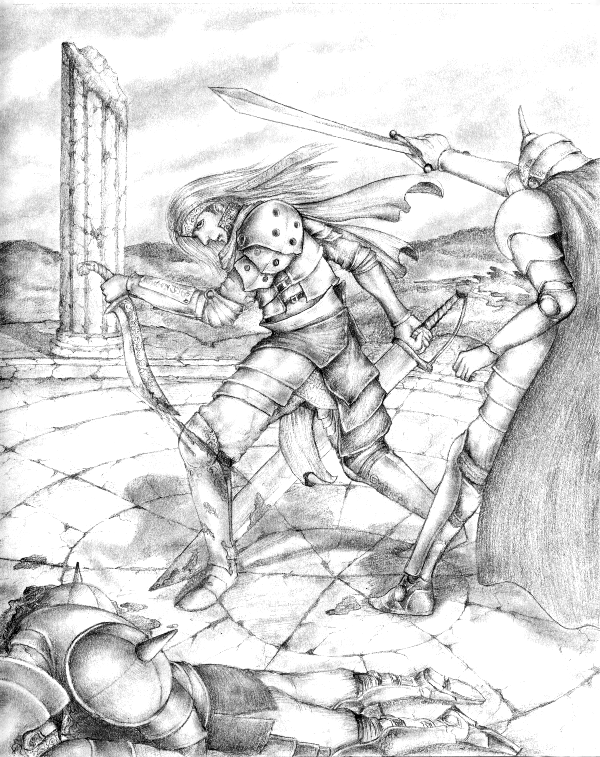

Bladefighters are found throughout the kingdoms and the free cities. Another name for a bladefighter is a hired blade. As you might imagine, there are many places in the kingdoms where hired blades earn tidy sums for their work. If you need to hire many blades, best look to the free cities where they understand the true value of gold.
There are three bladefighter trade classes. From highest to lowest these classes are:
Blademaster A master class bladesman. To become a blademaster, a bladesman must learn the trade of the weaponsmith, and after fashioning his own long blade, he must use that blade to defeat a magical beast, a champion or an outcast blademaster.
Bladesman A skilled bladesman who earns a living by his long blade. Bladesmen are often called into the service of the crown.
Blade An apprentice bladesman.
In the early days of the kingdoms, many entered the booksmith trade, but as the ages pass, fewer and fewer young people enter the trade. With an ever dwindling population of booksmiths, master booksmiths have grown far and few between. If you need to find a master booksmith, you’d better travel to a major city.
Because of their access to books and libraries, closed to all save noblemen, master booksmiths typically are very learned and this learning and the passing of years gives them wisdom, which is highly sought after. Many master booksmiths are also advisors to the noble houses, where they are involved in the politics of the land.
There are three booksmith trade classes. From highest to lowest these classes are:
Master Booksmith A master class booksmith. To become a master booksmith, a booksmith must scribe and bind a book for a nobleman or lore keeper, who must in turn bestow the title of master booksmith.

Booksmith A highly skilled scribe who is capable of writing and binding books. Some books, such as the Great Book of Sever, can take a lifetime to scribe.
Scribe A writer of scrolls and often a producer of parchment. Scribes are highly regarded, for there are few commoners who can read and write.
Becoming a coachman is one of the only ways to see the greater world in relative safety. Caravans are protected by armed escorts and kingdom soldiers. But the life of a coachman isn’t all flowers and green fields. Coachmen are the last line of defense in protecting travelers from street bandits, thieves, and things that go bump in the night. Because of this, the best coachmen have also trained as bladesmen.
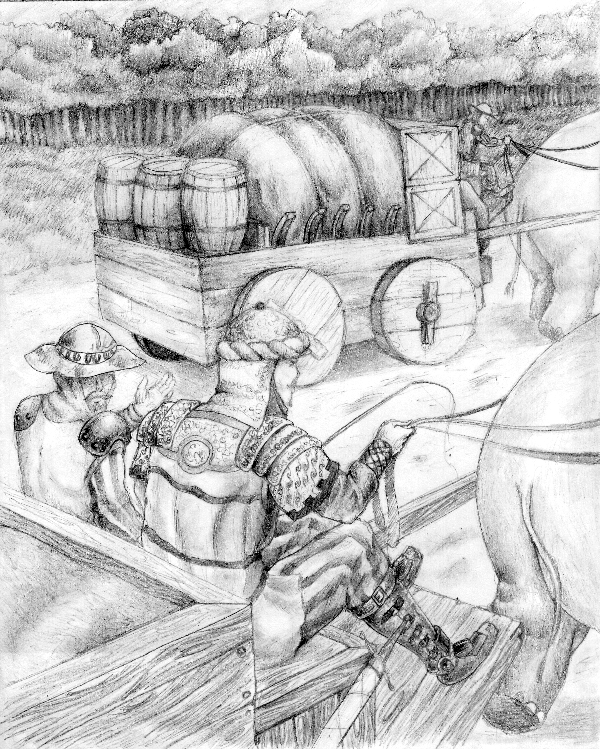
There are three coachman trade classes. From highest to lowest these classes are:
Carriagemaster A master class coachman, typically in the service of nobility. To become a carriagemaster, a coachman must train as a bladesman, become skilled in close-range and long-range fighting, and then prove himself on a journey.
Coachman A journeyman class, typically assisting a carriagemaster or acting as a carriage attendant.
Cart An apprentice coachman.
In cities, huntsmen rarely get the respect they deserve, but it is a foolish nobleman that keeps no huntsmen. For it is the huntsmen who learn the ins and outs of the wild country, the huntsmen who track the mysterious creatures that pass through the lands, and the huntsmen who learn how to trap what is needed when the winter snow chills the land.
A typical chief huntsman has a range, a given lot of land that he is responsible for keeping track of. The chief huntsman may assign senior huntsmen to look over parts of the land, but is ultimately responsible if something should happen within that range.
There are three huntsman trade classes. From highest to lowest these classes are:
Chief Huntsman A master class huntsman often in the employ of a noble family or great house. To become a chief huntsman, a huntsman must be appointed or must discredit the current huntsman and prove himself worthy of a promotion. Chief huntsmen are expert trackers and are skilled with many weapons, including bows and swords.

Huntsman A journeyman class hunter who earns a living hunting wild game and tracking.
Hunter An apprentice huntsman.
Directing a caravan train is not a job for the faint of heart. Caravanmasters must understand strategy and field tactics if they are to outwit Mother Nature (storms, floods, and other natural phenomena) and the mix of thieves, cutthroats, and dark creatures that they’ll encounter.
The best caravanmasters can create elaborate travel plans from two pieces of information: The starting point and the ending point of the journey. To be successful, the caravanmaster must be able to hire bladesmen, obtain supplies (food, horses, wagons, etc.) and complete the journey without causing or sustaining injury or losing the goods.
There are three lineman trade classes. From highest to lowest these classes are:
Caravanmaster A master class lineman, typically in charge of a caravan train bringing supplies to Kingdom cities and outposts. To become a caravanmaster, a lineman must survive the trade, follow the prescribed rules, and earn the trust of the garrison commander responsible for the routes traveled. If a garrison commander is willing to put his mark on a lineman’s caravan plans, the lineman has earned the promotion to master.
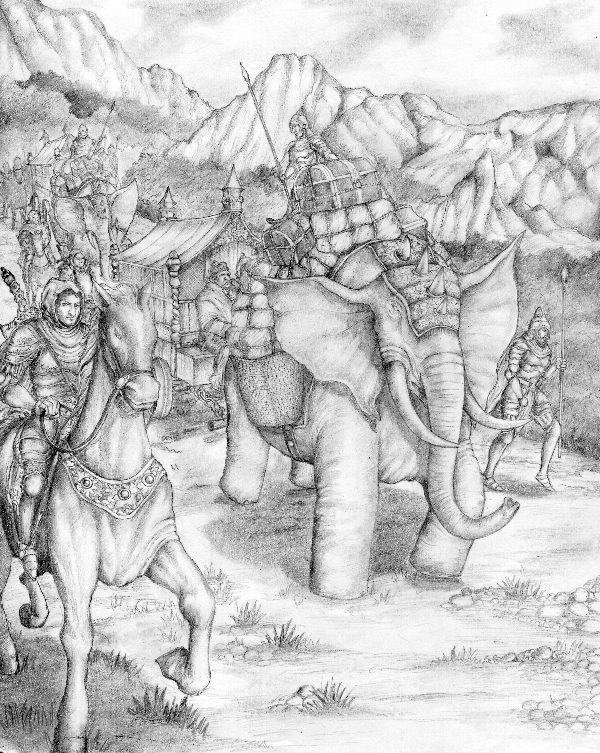
Lineman A journeyman class, typically responsible for a section of a caravan train.
Liner An apprentice lineman.
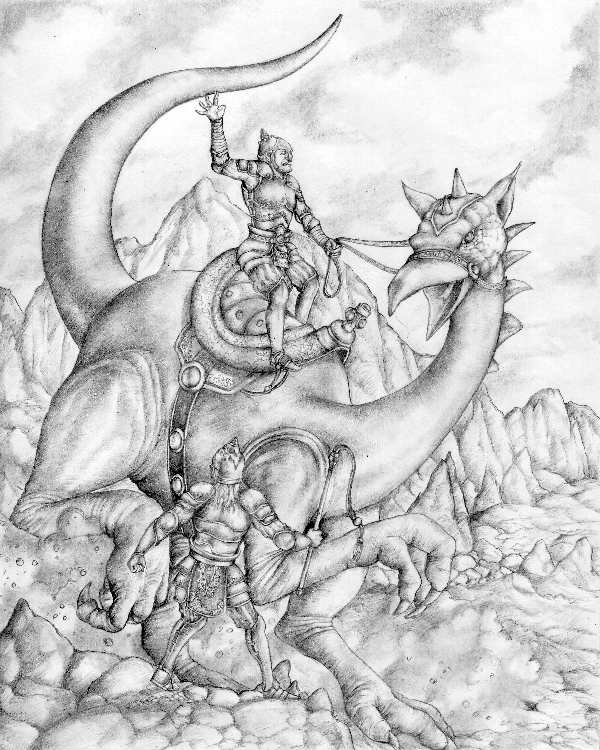
Ridesmen are found throughout the kingdoms and the free cities. It is a highly valued trade, as horses and other beasts of burden are the primary means of transporting people and goods. In the Kingdoms of Yug and Zapad, many exotic animals are used for riding, including elephants, zebras, and king cats. King cat riders can also be found in Vostok.
There are three ridesman trade classes. From highest to lowest these classes are:
Ridemaster A master class ridesman. To become a ridemaster, a ridesman must be able to tame any and all beasts of burden, from the wildest stallion to the exotic mounts of the southern kingdoms. But taming beasts of burden is only the beginning; ridemasters are showmen, earning the respect of the crowd with their skills, and teachers, able to teach proper riding technique to commoners, and lords and ladies alike.
Ridesman A skilled rider who earns his living doing show riding or horse taming.
Rider An apprentice ridesman.
Most shipwrights earn their pay and respect in coastal towns, building merchant fleets and military craft. Some live and work along the great rivers of the kingdoms. Master Shipwright Armon, who discovered the Mouth of the World, is said to have been the greatest shipwright that ever lived. Hundreds of years later, his designs for merchant galleys and war galleons are still the most duplicated in the kingdoms.
There are three shipwright trade classes. From highest to lowest these classes are:
Master Shipwright A master class shipbuilder, a highly sought after craftsman. Many live in Klaive and Wellison. To become a master shipwright, one must be able to read and write (rare skills in many parts of the kingdoms) and must prove oneself as a ship architect, designing and building multisailed vessels under the watchful eye of a current master shipwright.

Shipwright A builder of ships. Klaive is the primary shipbuilding port in Great Kingdom. Wellison is Sever’s shipbuilding port.
Shipper An apprentice shipwright.
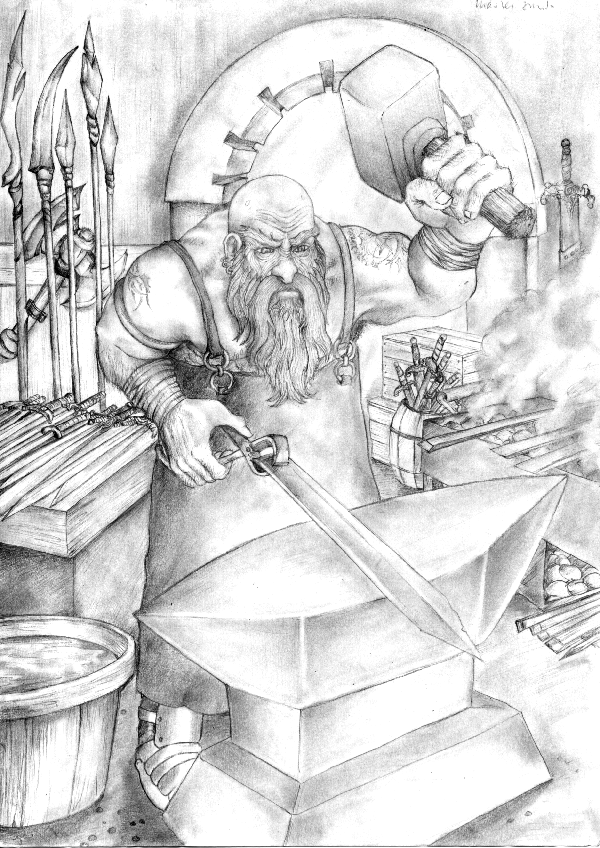
Every village and city throughout the kingdoms has one thing in common: Each has a blacksmith and that blacksmith is one of the most highly respected members of the community. It takes a certain kind of man (or woman) to pound steel, shape it against its will, and create the tools, weapons, and armor that are needed throughout the lands.
There are three smith trade classes. From highest to lowest these classes are:
Master Smith A master class smith, often working at garrisons and kingdom outposts. Master weaponsmiths and master armorsmiths specialize in the making of finely crafted weapons and armor respectively. The road to becoming a master smith is one of the longest in all the kingdom trades, especially for weapon and armor smiths. Master smiths earn their title by creating durable goods of fine quality. Claim the title too early, and a smith could end up with the sharp end of blade between the eyes.
Smith A forger of steel and other metals, a maker of weapons and armor. Weaponsmiths and armorsmiths are specialists in the making of weapons and armor respectively.
Ironer An apprentice smith.
Master stonecutters are the true wizards of the land. They use stones cut from mountains, dug from quarries, or shaped in kilns to build the unyielding structures needed to protect kingdomers from natural disasters and attack, to traverse rivers without having to find a ford, and to collect water from far-away places. Master stonecutters are the architects of castles, bridges, aqueducts, and roads. Kings, lords, ladies, and commoners alike commission their services.
There are three stonecutter trade classes. From highest to lowest these classes are:
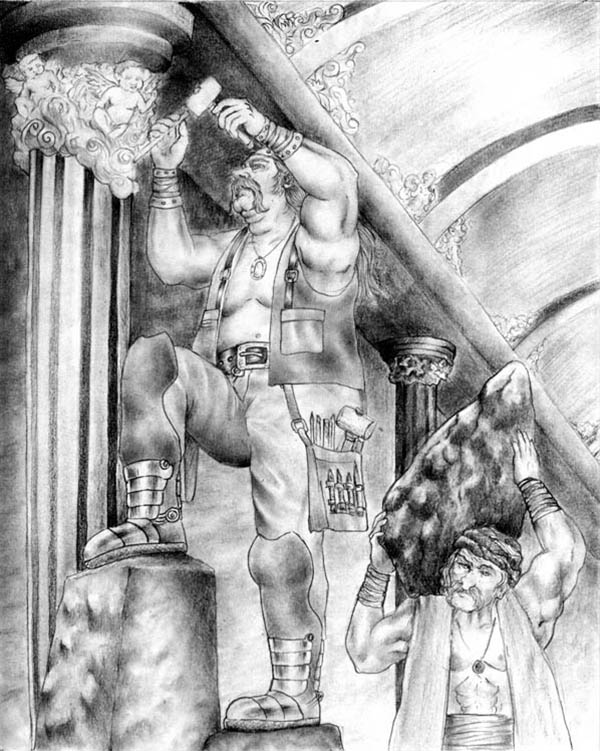
Master Stonecutter A master class stone and brick mason. To become a master stonecutter, a stonecutter must ply his trade for many years, honing his skills until he is recognized as the best of the best. As with smiths, it is a long road to becoming a master stonecutter, but the good news is that stonecutters often get to pave their own road through life.
Stonecutter A journeyman class stone and brick mason. Stonecutters know how to cut and shape stones, how to make and kiln brick, and how to mix quicklime.
Stoner An apprentice mason.
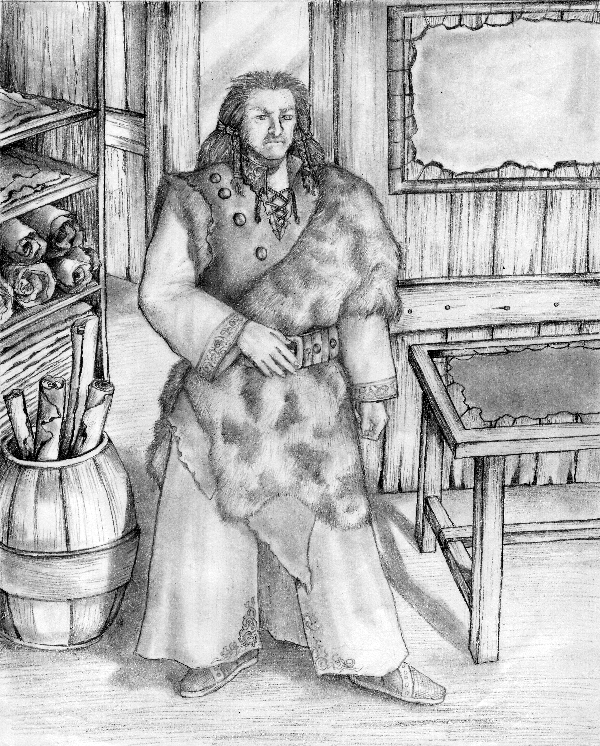
Away from the great cities of the Kingdoms where silk and cloth abound, the master tanner sets the fashion trend of the day with fur and leather. Take a tanner enough rabbit pelts, come back when it’s time, and you’ll have a coat. But being a tanner isn’t only about making clothes. Tanners make other goods, such as leatherskin canoes, covers for wagons, and padded leather suits for protection in the wilds.
There are three tanner trade classes. From highest to lowest these classes are:
Master Tanner A master class tanner. To become a master tanner requires great skill. A tanner must be able to fashion many different types of goods using wits and the animal skins supplied. Sometimes a tanner must make do with what’s available, fashioning the needed item as much with faith as with anything else.
Tanner A tanner of animal skins, a maker of leather goods.
Hidesman An apprentice tanner.
Because skills and preferences vary so greatly, woodworkers are some of the most misunderstood tradesmen in the whole of the kingdoms. Some woodworkers build structures: bridges, houses, and mills. Some prefer wagons, coaches, and carriages. Others become specialists, crafting small trade goods.
There are three woodworker trade classes. From highest to lowest these classes are:
Master Woodworker A master class woodworker. Master woodworkers often work with master stonecutters on construction projects, and their craft shows clearly in many structures, even those that are mostly of stone. To become a master woodworker, one must become the best at his craft and work hard to make a name for himself in his chosen area of woodworking.
Woodworker A craftsman who works with wood and has passed an apprenticeship.
Wooder An apprentice woodworker.
